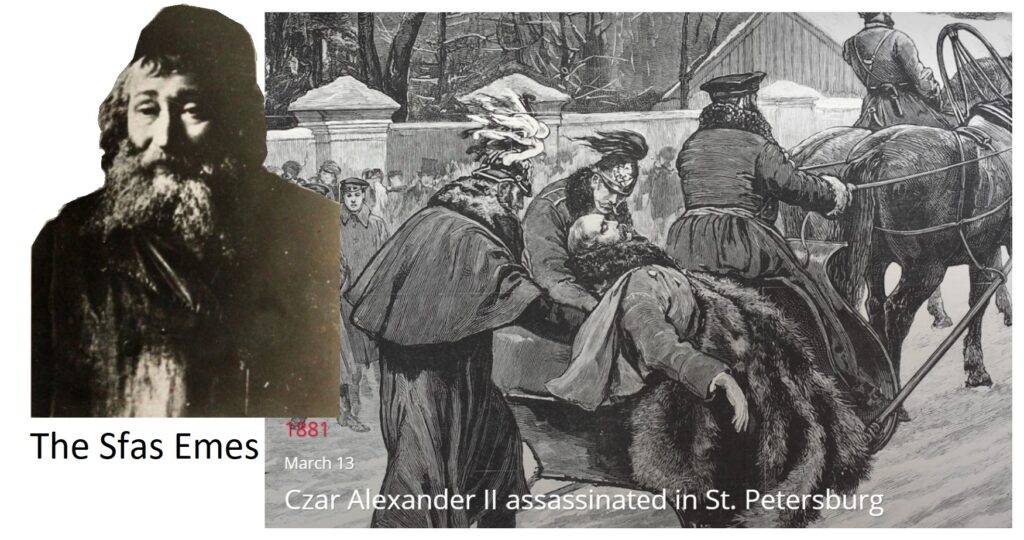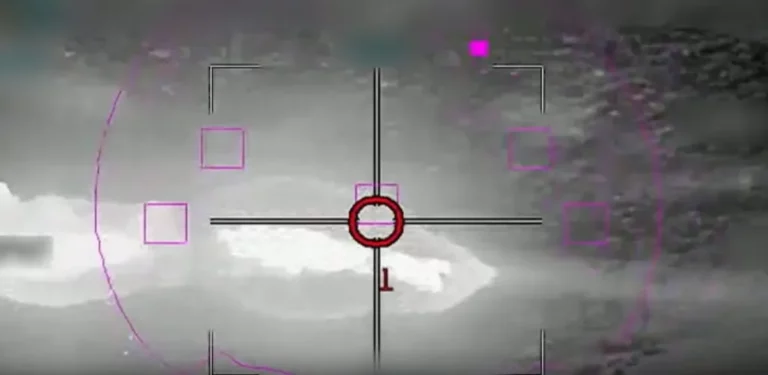by Rabbi Yair Hoffman for the Sfas Tamim Foundation
At times, one needs to understand the historical context of what our Gedolim have said – in order to fully plummet their meaning. This is especially true regarding the Sfas Emes, who lived during very dark times. In his piece on Parshas Vayigash (1884), this author believes we can gain new depth and inspiration through an examination of the circumstances behind his remarkable thought.
In recent times, many people have expressed shock at the rate of the societal decline around us. The Gerrer Rebbe, Rabbi Yehudah Aryeh Leib Alter (1847-1906), author of the Sfas Emes (Parshas Vayigash 5644 – 1884) lived and led his Chassidus during a very difficult time in Jewish history during our sojourm in Tsarist Russia. Let us get a brief picture of what going on. The Jewish nation had endured some horrible years under Nicolai the First. He had tried to convert young Jewish children by forcibly placing them in the army. These were called, “The Cantonist Decrees.” Young Jewish children were kidnapped by Khappers and placed in the Tsar’s army under dire circumstances. Klal Yisroel suffered immensely.
Then, it seems, that there was a bit of a reprieve. The next Tsar – Alexander the Second was much more liberal. He undid the Cantonist Decrees of his father. The harsh regime and rule of Tsarist Russia, seemed to have a bright light. But, he was soon assassinated. The next Tsar, Alexander the Third was a despot. Horrific pogroms soon ensued and the new Tsar was no friend of the Jews. Au contraire, he unleashed a notorious era of cruelty and anti-semitism.
In Parshas Vayigash of 1884, the Sfas Emes spoke. He explained one of the psukim in our parsha (Bereishis 46:4) which states, “And I shall go down with you toward Egypt” in the following manner:
This is actually a promise that Hashem will fulfill not just then to Yaakov Avinu, but for all future times – even our own times. It is connected to the pasuk in Tehillim (91:15), “And I shall be with him in sorrow.” This is what is elaborated in the Gemorah (Megillah 29a): “When they were exiled to Mitzrayim and to Bavel, the Shechina was with them.”
The meaning is that, somehow, someway, through the midos and character traits of Yaakov Avinu, the Shechina will dwell among Israel, even in the exile. This is the meaning of “Ered imcha Mitzraima – I shall go down with you toward Mitzrayim.”
The emphasis is that it is specifically with you and because of you. Hashem is telling Yaakov Avinu that he, Yaakov Avinu, is the reason. Through Yaakov, the Shechina will remain with us in the exile.
And, the Sfas Emes explained that it did transpire in the following manner: Through the shvatim, Yoseph went down to Mitzrayim. Through Yoseph, Yaakov Avinu went down to Mitzrayim. And through Yaakov Avinu, the Shechina went down to Mitzrayim.
It is quite clear that there is a sub-text going on here in the words of the Holy Sfas Emes. Through the shvatim – through the sins of the rest of the nation of Israel, the shvatim– meaning the Jews, we went down to this galus of a galus– that of Tsarist Russia beginning during the period of Tsarina Catherina when she took over Poland in 1795. But through Yoseph, i.e. the tzaddikim in Klal Yisroel, the unique Midah of Yaakov Avinu – meaning Emes – acting with truth at all times, the Shechina itself will be with us in this dark galus of a galus once again.
The Sfas Emes goes on to reassure us. Do not make an error to think that this level is far beyond us.
The fact is that within the nation of Israel, the essence and root of Yaakov Avinu is constantly with us, as Chazal have said, “the face of Yaakov Avinu is etched onto the Kisei HaKavod, therefore, any place that he (Yaakov Avinu) went down to, the Shechina went with him as well. The Sfas Emes explains this Midrash as follows: The metaphorical meaning of the face of Yaakov Avinu being etched onto the Kisei HaKavod is that the Shechina will always be with us when we exhibit the trait bequeathed to us by Yaakov Avinu. This is through the trait of Emes – truth, as it states in Micha (7:20), “You shall give the truth of Yaacov, the loving-kindness of Avraham, which You swore to our forefathers from days of yore” – which refers to the signet ring of Hashem.
“Therefore,” continues the Gerrer Rebbe, “through the trait of Emes – we can receive a chiyus – in other words – a life-sustaining injection in the exile as well.
“For the eclipsing and overshadowing of redemption is through sheker – lies.” It is clear that the Sfas Emes is referring to why the temporary reprieve of Alexander the Second’s reign was so short. He is explaining that it is due to our own spiritual decline. Things don’t just happen because a revolutionary band called the “People’s Will” throw a bomb in St. Petersburg at the Tsar of Russia! “For the fact is,” continues the Sfas Emes, “that Hashem’s dominion exists no matter what the government or temporal authority may be. Therefore, through the character trait of truth, redemption is awoken.”
When we realize the events that had transpired immediately before and during this remarkable section of the Sfas Emes, we now further understand that the Gerrer Rebbe is thus providing us with an avenue as to where we can direct our avodas Hashem. He is telling is that in order to face the societal downfalls that we are experiencing – we can and must make the commitment to everyday emes.
Why not subscribe to a weekly Parsha Sheet by Rabbi Yair Hoffman on the topic of Emes? Each week you can read 4 different columns on this wonderful midah. Send an email to [email protected] with the word “subscribe” in it.












12 Responses
אנכי ארד עמך מצרימה, ואנכי אעלך גם עלה
Seforim point out that the אנכי is placed BEFORE עמך!
These Seforim explain that it’s not that HKB”H “follows” the Yidden into Golus.
Rather, HKB”H “precedes” the Yidden into Golus and greets them upon their arrival.
Likewise, He already precedes us and prepares for us the אעלך גם עלה, awaiting our arrival in the Geulah.
wow, I can’t take back any comments but I can add that I am so greatful for being a Frum Woman with such a rich history that constantly unfolds, but I do believe that in 217 years when we reach 6000 I trust there are more who follow Hashem and won’t get trapped into Esau’s net……do not want to miss Olam Haba
S.R. – don’t you know that “No Jew Will Be Left Behind”?!
Catherine was actually good for the Jews. As I understand it she was the one who invited the Jews to settle in Russia itself, where there had previously been no Jews. The problems started only under Nicholas I.
Rebbitzen Gold…, that statement is false — against what Chazal say.
א) תנן (סנה’ צ, א) כל ישראל יש להם חלק לעוה”ב כו’ ואלו שאין להם חלק כו’ ירבעם אחאב ומנשה כו’. ופסק הרמב”ם (הל’ תשובה פ”ג) שכל ישראל יש להם חלק לעוה”ב אע”פ שחטאו כו’ ואלו הן שאין להם חלק כו’ במה דברים אמורים שכל אחד מאלו אין לו חלק לעוה”ב, כשמת בלא תשובה, אבל אם שב מרשעו כו’ אפילו כפר בעיקר כל ימיו ובאחרונה שב (עיין ירושלמי פאה פ”א ה”א) יש לו חלק לעוה”ב כו’.
ומוסיף והולך: כל הרשעים והמומרים וכיו”ב שחזרו בתשובה כו’ במטמוניות כו’ אע”פ שעדיין שובב הוא שהרי בסתר שב ולא בגלוי מקבלין אותו בתשובה. עכ”ל.
ב) למטה מזה: מי שלא שב אפילו בסתר כי אם מת ברשעו, אם יש לו תרופה.
אמרז”ל (סנה’ קד, א) ברא מזכי אבא, פי’ שאם הבן צדיק מביא לחיי עוה”ב את אביו, שכבר מת וצריך הי’ להיות נמנה בין אלו שאין להם חלק לעוה”ב, והיינו אפילו בלא תפלה ע”ז מצד הבן, כי בתפלה גם אבא מזכה ברא, וכמוש”כ בתירוץ שני בתוד”ה דאתיי’ (סוטה י, ב) 3.
ולא עוד אלא שאפי’ השתדלות ותפלת אחרים, שאינם קרוביו, מהני, וכדאי’ בחגיגה (טו, ב) דהועיל ר’ יוחנן לאלישע אחר (ואפילו להביאו לג”ע) אף שלא הי’ קרובו ולא 4תלמידו.
– אלא שאין תפלת אחרים יפה כ”כ כמו תפלת הבן והאב, כי כמה מעלות בתפלה בהתאם לאיש המתפלל, מקום התפלה ועוד. ואכמ”ל –
עוד יש להביא ראי’ דתפלת אחרים מהני אף לאחר מיתה, מהא דאיתא בספרי ס”פ שופטים שלכל יוצאי מצרים שמתו כבר יש כפרה ע”י שזקני בית דין דעיר אחת היו מביאין עגלה ערופה. וראה בסו”ס חסידים, במפרש שם בזה.
ואפשר הי’ לחלק מנדו”ד, דשאני התם שב”ד הם שלוחי כל העיר ובעיר זו אירע העון וא”כ אינם אלא מסלקים מעל יוצאי מצרים ומכפרים עליהם על העון שעשו משלחיהם.
אבל לא משמע כן כיון דמספרי זה למדו לדור צדקות בעד המתים, כדאיתא באו”ח (סו”ס תרכ”א), ומנהג ישראל לדור גם בעד מתים שאינם קרוביו.
ובכל אופן אינו דומה ממש לנידון דידן, כי שם קאי במתים צדיקים דמשערינן שאם היו בחיים היו הם נותנים לצדקה, אבל לרשעים לא מהני, וכמ”ש במג”א שם.
ג) למטה מזה: מי שהוא מסוג אלו שאין להם חלק לעוה”ב ולא שב ולא התפללו עליו ולא נתנו צדקה עבורו אין לו חלק לעוה”ב דוקא כשלא נפרעו ממנו לאחר מיתה, אבל אם נפרעו ממנו הפרעון מצילו ומועיל לו, וכמרז”ל (סנה’ מז, א) סימן יפה למת שנפרעין ממנו לאחר מיתה (דיש לו כפרה בכך, רש”י). ואפילו ברשעים חמורים ביותר מהני להו, כדאיתא שם (קג, ב ושם) שיהויקים ראוי הי’ למנותו עם ירבעם אחאב ומנשה – ואדרבה הכעיס עוד יותר ממנשה – אלא שנתכפר לו ע”י שנתבזה אחרי מיתתו.
וגדולה מזה מצינו בירושלמי (כלאים פ”ט ה”ג) דאפילו ירבעם וחבריו שמנו באותן שאין להם חלק לעוה”ב, הנה ע”י אשר – שנים רבות אחרי מיתתן – נשרף גופן נעשית בהם מדת הדין ובצירוף זכות הארץ יזכו לתחי’5.
– ואין להקשות דא”כ מאי שנא ירבעם וחבריו דמנו אותם במתני’ שאין להם חלק לעוה”ב, אף שנתכפר להם אח”כ, ולא מנו את יהויקים.
דאינם דומים זל”ז: ביהויקים הא דקבורת חמור יקבר הי’ זה גזר דינו שלו על עשית החטא ובחייו כבר נגזר עליו, משא”כ בירבעם וחבריו שלא הי’ עונש השריפה עליהם כי אם על ארץ ישראל ולאחר כמה שנים, אלא שהם היו קבורים שם ובמילא גם גופם נשרף, ולכן עד אז ומצד עצמם חל עליהם הענין דאין להם חלק לעוה”ב.
– Contniued –
אחר שנת”ל אפשריות הדבר יש להביא ראי’ שיהי’ כן, שכאו”א מישראל, יהי’ מי שיהי’, יתאחד סוף סוף בשרשו ומקורו, והוא:
נת”ל דתשובה לכל מהני. והנה ארז”ל (רמב”ם הל’ תשובה פ”ז ה”ה וכדעת ר’ יהושע בסנה’ צז, ב): וכבר הבטיחה תורה שסוף ישראל לעשות תשובה בסוף גלותן.
והנה יכול האומר לומר, שבכהנ”ל הנה, כמו בכ”מ הרי גם פה, התורה על הרוב – רוב בנ”י – תדבר, ואין מזה ראי’ שכאו”א מישראל, ואפילו רשעים גמורים, ישובו. אבל מבואר הדבר בערובין (כא, ב) דקאמר שם: תאנים הטובות אלו צדיקים גמורים תאנים הרעות אלו רשעים גמורים, ושמא תאמר אבד סברם ובטל סכוים ת”ל הדודאים נתנו ריח אלו ואלו עתידים שיתנו ריח.
ומדקאמר שיתנו ריח – ראי’ ג”כ שאין לומר שרק יפסוק דינם ויהיו לא חיים ולא נדונים ושרוים בלא טובה ובלא רעה – כל’ התוד”ה (ב”מ נח, ב). – ועיין שבת (פח, ב) ע”פ עד שהמלך במסבו נרדי נתן ריחו, ובפירש”י (שה”ש ז, יד) הדודאים נתנו ריח הטובות והרעות… אלו פושעי ישראל… כולם מבקשים פניך ועל פתחינו כל מגדים יש בידנו שכר מצות הרבה, עכ”ל. והוא כנ”ל, שאפילו פושעי ישראל יש להם חלק לעוה”ב מפני שהם מלאים מצות כרמון.
עוד שם בעירובין (יט, א) דקרא (ישעי’ בסופו) ויצאו וראו גו’ ואשם לא תכבה קאי בפושעי אוה”ע, אבל פושעי ישראל מיחייבו רק ההוא שעתא בגיהנם ואתי אברהם אבינו ומפיק להו (היינו שפוסק דינם. ועוד זאת) ומקבל להו, בר מישראל שבא על הנכרית כו’. וגם בזה פי’ בתוד”ה חוץ (ב”מ נח, ב) דהכונה היא דישראל הבא על הנכרית אינו עולה מיד אלא שוהה שם יב”ח.
אלא שראי’ זו יש לדחות ע”פ מ”ש בתוד”ה פושעי (סוף חגיגה) דלא קאי על פושעי ישראל בגופם, ובכ”ז לא יקשה על התוס’ בחגיגה למה מפרש – בעירובין – קרא דישעי’ בפושעי או”ה ולא בפושעי ישראל בגופם, כי זוהי אוקימתא מרווחת יותר, ודוחק. וצע”ק בדברי תוס’ הנ”ל מתוד”ה כי (ר”ה יז, א).
והנה בנין אב מקרא שכאו”א מישראל יתדבק בשרשו הוא מה שנאמר (ש”ב יד, יד) וחשב מחשבות לבלתי ידח ממנו נדח, והובא פי’ בשו”ע אדה”ז הל’ ת”ת (פ”ד ס”ג): רשע יחזור בתשובה בגלגול זה או בגלגול אחר כמ”ש כי לא ידח ממנו נדח. ובתניא (ספל”ט): שבודאי סופו לעשות תשובה בגלגול זה או בגלגול אחר כי לא ידח ממנו נדח. ועיג”כ לקמן בזה.
(וצע”ק ברמב”ן ש’ הגמול ד”ה ועכשו נחזור, שכתב: לבלתי ידח ממנו נדח אלא לאותן שאינן עומדין בדין שנכרתין בו ואובדין שם).
– Continued –
עמק המלך (בתחלתו ש’ תקוני התשובה ספ”ג) וז”ל: ועתה בנים שמעו לי יראת ד’ אלמדכם ואהבתו הק’ עמנו בני א-ל חי, למה לו כולי האי לטרוח עצמו ברשעים האלו המכעיסים אותו בכל עת ובכל רגע, ב’ תשובות בדבר התשובה הא’ כו’ אע”פ שהם רשעים גמורים כו’ ניצוצי קדושה בהם כו’ שהם נצר מטעי כו’ והיא חלק אלקה היא נצחי כו’ והנשמות הם רושם אור עצמותו וכל (אולי צ”ל “דכל”) הנופח מעצמותו הוא נופח כו’ ועוד טעם שני מעשה ידי להתפאר כו’ הק’ הוא ומעשה ידיו חיים וקיימים לעד ולעולמי עולמים ואי אפשר שתתבטל כו’.
עוד כ’ (בשער או”א ספמ”ו): לבלתי ידח ממנו נדח כו’ וכל כך למה מפני שהק’ עצמו בנה עולמות והחריבן להיות טו”ר בעולם גברה בהם הרע כ”כ עד שיורש גיהנם כו’ ומפני שהוא גרם בניזקין לכן מוריד שאול ויעל ומעלה אותם כו’ והם ילכו מחיל אל חיל עד הגיעם אחר זמן רב להמנות עם הצדיקים כו’.
ובמדרש שמואל ריש מס’ אבות בפי’ משנת כל ישראל כתב וז”ל: עולם הבא הנזכר כאן הוא עולם התחי’ ולא ישא אלקים את נפש הרשע עד כי ברוב הימים ימצאנה מטוהרה ואז נגנזת במחיצת הצדיקים כו’ וכן ע”ז הדרך לכל הנשמות עד שיתוקנו כולם כו’ וז”ש הכתוב ועמך כולם צדיקים כלומר בהכרח יהיו כולם צדיקים לפי שהוא ית’ חשב מחשבות לבלתי ידח ממנו נדח, עכ”ל.
ועד”ז הוא באלשיך פ’ שמיני.
ויסוד לדברי כהנ”ל הוא בליקוטי הש”ס להאריז”ל מס’ אבות, וז”ל: כל ישראל יש להם חלק לעוה”ב כו’ רק שזה יתקן עצמו בזמן מועט וזה בזמן מרובה אבל סופם הוא להמנות עם הצדיקים ומשום זה שהקב”ה כביכול מטריח את עצמו עם רשעים כאלו לתקנם כו’ ולמה כן בשביל שהם נצר מטעי שהוא נצחיי והם רושם אור עצמותו וכל הנופח מעצמו הוא נופח. עכ”ל.
(ש’ רישא דז”א ספמ”ח): ברוך ה’ אלקי אברהם איש החסד, שלא השבית חסדו ואמתו מעמו ישראל לבלתי ידח ממנו נדח, כי לא כלו רחמיו על כל היצור שנאמר ורחמיו על כל מעשיו, נמצא כל ישראל יש להם חלק לעולם הבא, שנאמר ועמך כולם צדיקים לעולם ירשו ארץ נצר מטעי מעשי ידי להתפאר.
But Rebbitzen….you omitted the part where it says that those who claim to speak in the nameh of the emahot and who disparage other yidden through lashon horah and hateful statements risk losing their chelek of olam haboh.
Rebbetzin Gold…, there is a difference between surviving the coming of Moshiach din and having a portion in Olam Ha’ba. Even from what you brought down about the latter, it is clear that not every Jew has a portion there.
Thank you Rebbitzen for explaining this important point
Rebetzin Gold, and some of the things that you brought are a matter of dispute if not totally rejected.